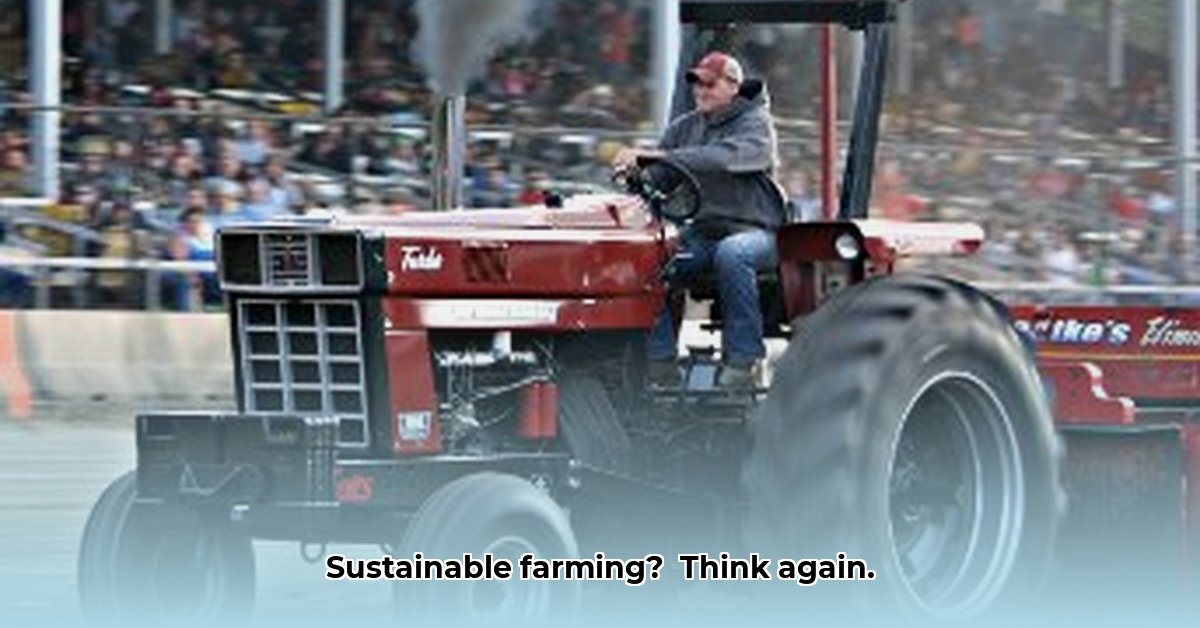
The Thunder and the Whisper: Where Power Meets Progress
Imagine the earth-shaking rumble of colossal engines, the smell of burnt diesel mingling with the dust kicked up by giant tires. This isn't a demolition derby; it's farmstock tractor pulling, a spectacle of raw power and precision engineering. These aren't your grandfather's tractors; they’re heavily modified behemoths, meticulously tuned to pull incredible weights. But could this adrenaline-fueled sport hold lessons for sustainable agriculture? The answer might surprise you. Isn't it fascinating how seemingly disparate worlds can intersect? For more on large-scale agricultural machinery, check out this resource.
Beyond Brawn: The Engineering of Efficiency
These aren't just tractors; they're rolling testaments to human ingenuity. Every component, from the engine to the tires, is optimized for maximum pulling power. This relentless pursuit of performance, however, inadvertently drives advancements in fuel efficiency. Advanced fuel injection systems, lightweight materials, and aerodynamic designs all contribute to minimizing fuel consumption. This quest for victory directly translates into innovations that could easily be applied to the agricultural sector—resulting in less fuel usage, fewer emissions, and ultimately, a more sustainable farming practice. How impactful would it be if this drive for efficiency became standard practice across the farming industry?
Powering the Future: Fuel and the Farm
Fuel is the lifeblood of these machines, and the choices made here offer a window into the future of sustainable agriculture. While most teams currently rely on diesel, a growing number are experimenting with biodiesel and other alternative fuels. This isn't just a trend; it’s a potential game-changer. Could farmstock tractor pulling become a testing ground for greener fuels? The possibility is exciting. Imagine if these competitions became showcases for biofuel innovations, pushing the development of sustainable energy sources for the wider agricultural industry. What a powerful platform for change!
More Than Just a Show: The Economic Impact
Farmstock tractor pulling isn't just a competition; it's a community event. These events draw large crowds, boosting local economies. Hotels, restaurants, and shops all benefit from the influx of visitors. This economic impact is particularly significant in rural areas, often revitalizing communities and providing vital job opportunities. The economic injection from these events should not be overlooked. Could we leverage this economic influence to support the development and implementation of sustainable agricultural practices?
The Human Side: Skill, Teamwork, and the Tractor's Heart
Beyond the machines lies the heart of the competition: the people. The skilled mechanics who meticulously maintain these powerful machines, the brave drivers who control them, and the supportive teams working behind the scenes all represent a dedication and precision that mirrors the commitment needed for successful sustainable farming. The sheer level of teamwork required is remarkable, almost artistic in the way each individual contributes to the overall success. Their dedication to this particular sport illustrates the levels of dedication needed to champion a cause like sustainable agriculture.
The Seeds of Change: Future Collaborations
While not directly related, the parallels between farmstock tractor pulling and sustainable agriculture are undeniable. The inherent drive for efficiency, willingness to experiment, and commitment to innovation within this community offer valuable lessons. This passion for pushing boundaries could inspire new ideas and improvements in farming practices for a more sustainable future. The synergy between these two worlds may be more impactful than we could have ever imagined. It encourages discussions about how we may be able to leverage this to spread awareness of better practices.
Sustainable Practices in Farmstock Tractor Pulling: A Closer Look
| Practice | Description | Benefits for Sustainability | Potential Challenges |
|---|---|---|---|
| Enhanced Fuel Efficiency | Optimizing engine performance to minimize fuel consumption. | Lower greenhouse gas emissions; reduced reliance on fossil fuels. | High initial investment in R&D and advanced equipment is often necessary. |
| Biofuel Exploration | Research and implementation of alternative fuels, such as biodiesel. | Reduced reliance on fossil fuels; potential for carbon-neutral fuel sources. | Biofuel production, consistency, and scalability remain key challenges. |
| Material Science Advancements | Using lighter yet stronger materials to reduce tractor weight and fuel usage. | Reduced fuel consumption; lower emissions during transport. | Finding materials that balance strength, weight, and cost can be difficult. |
| Data-Driven Optimization | Utilizing data analytics to fine-tune performance and maximize fuel efficiency. | Enhanced efficiency and resource management; reduced overall environmental impact. | Requires sophisticated data analytics and high-quality data collection. |
| Community Engagement and Outreach | Promotion of sustainable practices within and beyond the farmstock pulling community. | Education and awareness raising regarding sustainability; fostering collaboration and innovation. | Effectively conveying complex information to a diverse audience. |
The roar of the engines at a farmstock tractor pull might one day be accompanied by the quiet hum of progress toward a more sustainable agricultural future. The potential for positive change is undeniable.